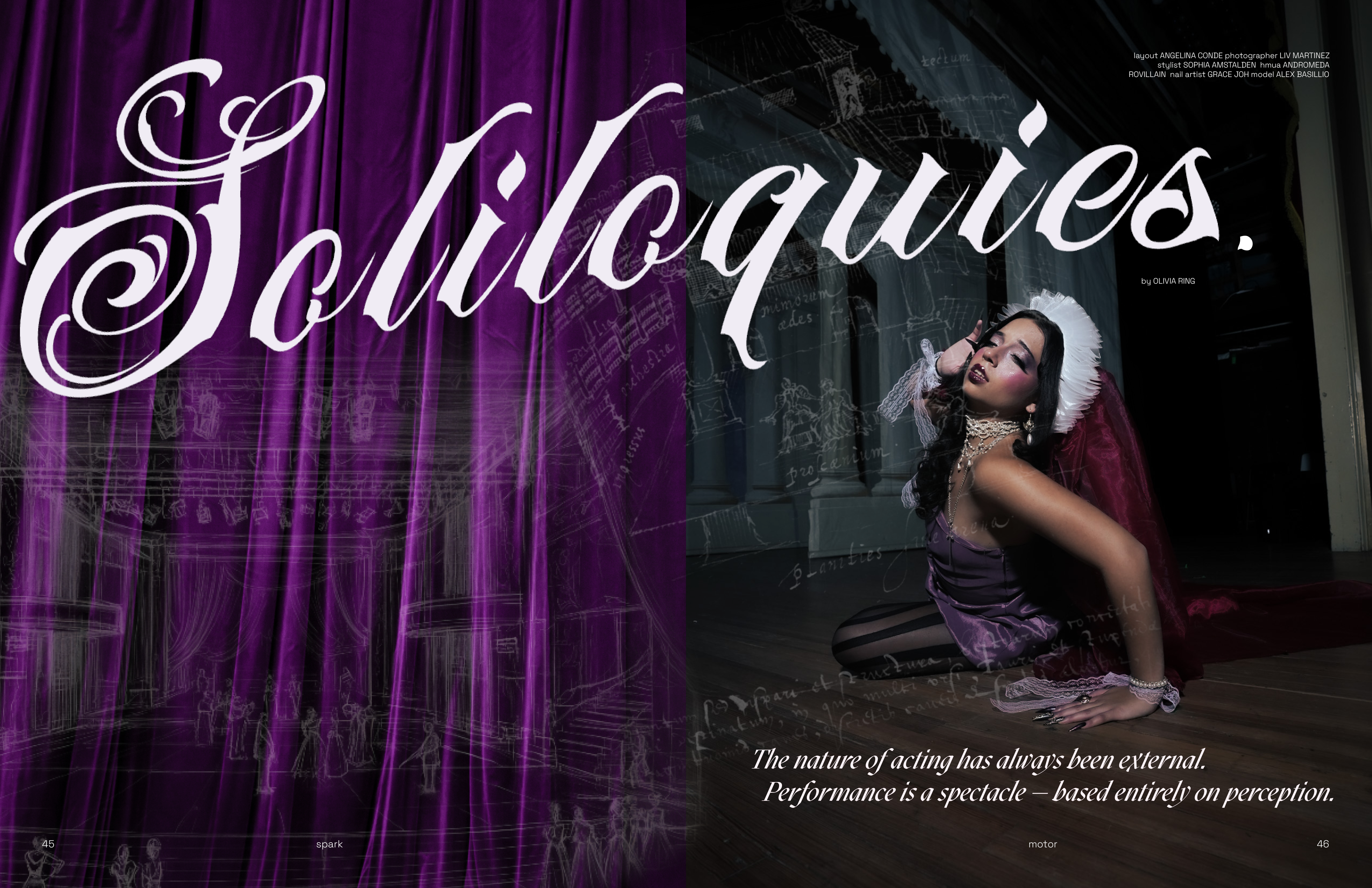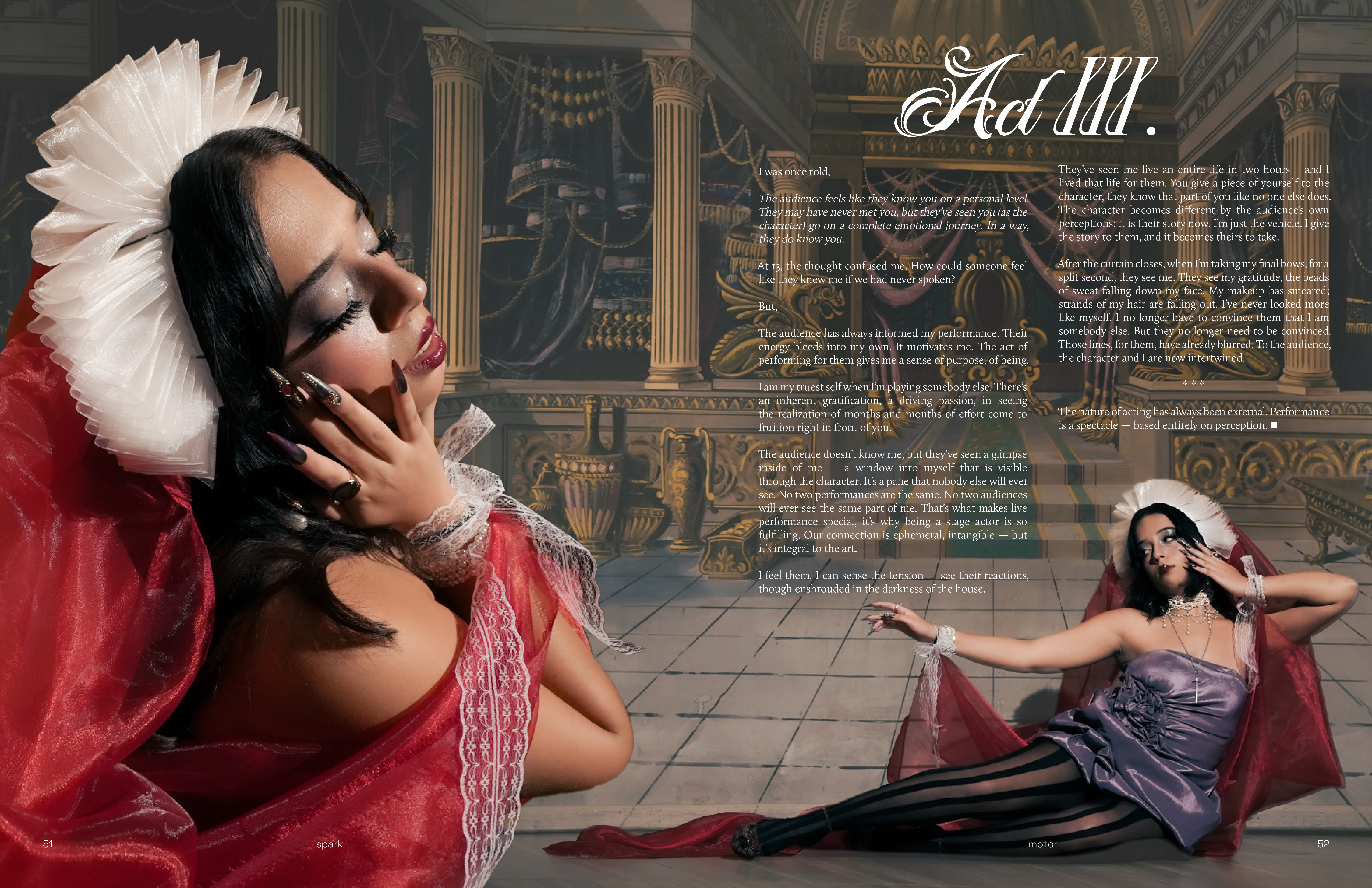Soliloquies
By Olivia Ring
December 8, 2024




| I grind the mud between my molars. It clings to my gums, thick and suffocating. |
“Acting is the most personal of our crafts. The make-up of a human being – his physical, mental and emotional habits — influence his acting to a much greater extent than commonly recognized.” - Lee Strasberg
ACT I.
A black and white documentary projects onto the screen.
I sit in class, struggling to keep my eyes open.
ACTING IS INTERNAL, The Method preaches.
On the screen, middle-aged men, who have long since died, drone on about authenticity in performance. Draw from your own memories, return to the emotions that you haven’t buried.
This doesn’t always work for me, though. I’m indecisive.It’s my biggest flaw. I’m unable to live in the moment, too consumed with what to say, do, feel next. I can’t choose one memory. Which evokes the right emotion? The most authentic emotion? Is there ever only one?
There are aspects of the method that work, I agree, but the larger interpretation of The Method as an internal movement doesn’t. Acting is about everything but you. You’re a moving part in the telling of a larger narrative.
Theoretical interpretation implies that there is only one feeling to recall, but you never feel just one emotion in any given moment. The most realistic performance is the one that elicits humanity in its most authentic form.
The way you play a character is so fundamentally interlaced with your own self. In a sense, me and the characters I’m playing are one in the same.
To completely, genuinely embody a character, you have to maintain a part of yourself inside of them. Your own sense of humor, your awkward laugh, the way you wring your hands when you’re nervous – these can belong to your characters, they can make them feel real.
My work as a performer is to elevate the story, to make sure the story is told as honestly as possible. My tether to my character is the first step along the way.
ACT II.
I hold a script in my hands — an ease settles in.
I’m comfortable with Shakespeare. The character sits in my chest, lifting me up with a confidence I only feel when I’m on stage.
Across from me, people I’ve only spoken to through prose watch me intently.
We barely know one another. We spend nine hours in the same room together every week going through complete emotional journeys through the characters we’re playing. Yet I feel like I don’t know them at all.
Maybe they’ll never see me beyond the guise of my character. Maybe we’ll be confined to an eternity of only knowing a persona grounded in pretense.
Though, I see their subtleties — their idiosyncrasies. The way they quirk their mouth up after they deliver a quip, the way another delivers a certain line in the same cadence each time we run the scene.
It’s small, but it feels vital.
There, a crack begins to form. Between the character and the actor — a scene partner and a friend. It’s a healthy break, a necessary line.
We bond through the hours spent in a classroom, running the same scenes a myriad of different ways. During short breaks, we talk about our classes, our walks to rehearsal, what we ate for dinner. Afterward, we catch a movie and indulge in the early stages of friendship.
It’s an oddly intimate process, developing two separate relationships with someone — the on-stage and the off. You know your scene partners on two separate planes: as the character and as themselves. You need to know both for it to work in the show. Creating a realistic dynamic, reacting to them the way you’d react to your real friend or mother or brother, that’s the foundation of your performance. Once you’re familiar with them, reacting to them becomes second nature.
I find it easier to connect with people that way, through playing somebody else.
ACT III.
I was once told
The audience feels like they know you on a personal level. They may have never met you, but they’ve seen you (as the character) go on a complete emotional journey. In a way, they do know you.
At 13, the thought confused me. How could someone feel like they knew me if we had never spoken?
But,
The audience has always informed my performance. Their energy bleeds into my own. It motivates me. The act of performing for them gives me a sense of purpose, of being.
I am my truest self when I’m playing somebody else. There’s an inherent gratification, a driving passion, in seeing the realization of months and months of effort come to fruition right in front of you.
The audience doesn't know me, but they’ve seen a glimpse inside of me — the window into myself that is visible through the character. It’s a pane that nobody else will ever see. No two performances are the same. No two audiences will ever see the same part of me. That’s what makes live performance special, it’s why being a stage actor is so fulfilling. Our connection is ephemeral, intangible — but it’s integral to the art.
I feel them. I can sense the tension – see their reactions, though enshrouded in the darkness of the house.
They’ve seen me live an entire life in two hours – and I lived that life for them. You give a piece of yourself to the character, they know that part of you like no one else does. The character becomes different by the audience’s own perceptions; it is their story now. I’m just the vehicle. I give the story to them, and it becomes theirs to take.
After the curtain closes, when I’m taking my final bows, for a split second, they see me. They see my gratitude, the beads of sweat falling down my face. My makeup has smeared; strands of my hair are falling out. I’ve never looked more like myself. I no longer have to convince them that I am somebody else. But, they no longer need to be convinced. Those lines, for them, have already blurred. To the audience, the character and I are now intertwined.
***
The nature of acting has always been external. Performance is a spectacle — based entirely on perception. ■
Layout: Angelina Conde
Photographer: Liv Martinez
Stylist: Sophia Amstalden
HMUA: Andromeda Rovillain
Nail Artist: Grace Joh
Model: Alex Basillio
Other Stories in Motor
© 2025 SPARK. All Rights Reserved.
